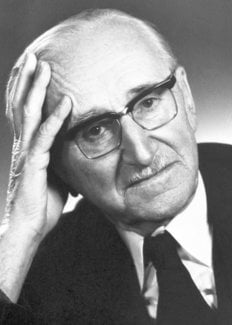Friedrich von Hayek
Biographical
 Born: May 8, 1899, Vienna, Austria (son of Dr. August von Hayek, Professor of Botany at the University of Vienna and Felicitas née Juraschek)
Born: May 8, 1899, Vienna, Austria (son of Dr. August von Hayek, Professor of Botany at the University of Vienna and Felicitas née Juraschek)
| Education | |
| 1918-1921 | Studies at University of Vienna |
| 1921 | Dr. jur., University of Vienna |
| 1923 | Dr. rer. pol, University of Vienna |
| March 1923 – June 1924 |
Postgraduate work, New York University |
| Academic Appointments | |
| 1927-1931 | Director, Österreichisches Institut für Konjunkturforschung (Austrian Institute for Trade Cycle Research) |
| 1931-1950 | Tooke Professor of Economic Science and Statistics, University of London (London School of Economics and Political Science) |
| 1950-1962 | Professor of Social and Moral Science, University of Chicago (Committee on Social Thought) |
| 1962-1968 | Professor der Volkwirtschaftslehre, Albert- Ludwigs-Universität, Freiburg im Breisgau |
At various dates, Visiting Professor at the Universities of Stanford, Arkansas, Virginia, California (Los Angeles), Cape Town and Salzburg
| Honors and Fellowships | |
| 1944 | Fellow, British Academy |
| 1970 | Korrespondierendes Mitglied der Österreichischen Akademie der Wissenschaften |
| 1972 | Honorary Fellow, London School of Economics |
| Honorary Degrees | |
| 1964 | Dr. jur. h.c., Rikkyo University, Tokyo |
| 1971 | Ehrensenator der Universität Wien |
| 1974 | Dr. jur. h.c., Universität Salzburg |
| Others | |
| 1917-1918 | War service, Austro-Hungarian Army (Italian Front) |
| 1921-1926 | Legal Consultant, Austrian government, for carrying out provisions of Peace Treaty |
| Books Published |
| Geldtheorie und Konjunkturtheorie, Wien, 1929, also in English as Monetary Theory and the Trade Cycle, London, 1933, as well as in Spanish and Japanese translations. |
| Prices and Production, London, 1931, also in German, Chinese, French and Japanese translations. |
| Monetary Nationalism and International Stability, London, 1937. |
| Profits, Interest, and Investment, London 1939. |
| The Pure Theory of Capital, London, 1940, also in Japanese and Spanish translations. |
| The Road to Serfdom, London and Chicago, 1944, also in Chinese, Danish, Dutch, French, German, Italian, Japanese, Norwegian, Portuguese, Spanish and Swedish translations. |
| Individualism and Economic Order, London and Chicago, 1949, also in German and an abridged Norwegian translation. |
| John Stuart Mill and Harriet Taylor, London and Chicago, 1951. |
| The Counter-Revolution of Science, Chicag,o 1952, also in German, Italian and an abridged French translation. |
| The Sensory Order, London and Chicago, 1952. |
| The Constitution of Liberty, London and Chicago, 1960, also in Spanish, German and Italian translations. |
| Studies in Philosophy, Politics, and Economics, London and Chicago, 1967. |
| Freiburger Studien, Tübingen 1969. |
| Law, Legislation and Liberty, vol. I, Rules and Order, London and Chicago, 1973. |
| Edited by F. A. Hayek |
| Beiträge zur Geldtheorie, Wien, 1931. |
| Collectivist Economic Planning, London, 1935, also in French and Italian translations. |
| Capitalism and the Historians, London and Chicago, 1954, also in Italian translation. |
This autobiography/biography was written at the time of the award and first published in the book series Les Prix Nobel. It was later edited and republished in Nobel Lectures. To cite this document, always state the source as shown above.
Friedrich August von Hayek died on 23 March 1992.
Explore prizes and laureates
Look for popular awards and laureates in different fields, and discover the history of the Nobel Prize.
